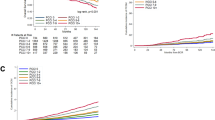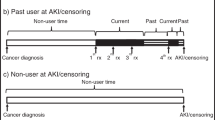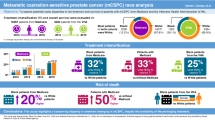Abstract
Background
Androgen deprivation therapy (ADT) is frequently utilized in conjunction with radiotherapy (RT) in the definitive management of prostate cancer. Prior studies have suggested an association between ADT use and acute kidney injury (AKI), however, these included heterogeneous populations undergoing a variety of treatments and relied on billing codes to ascertain the incidence of AKI.
Methods
We analyzed a cohort of 27,868 veterans undergoing definitive RT + /− ADT for prostate cancer between 2001 and 2015 using the Veterans Affairs Informatics and Computing Infrastructure (VINCI). Exposure was defined as use of ADT within one year of diagnosis. The primary outcome was AKI, defined by an increase in serum creatinine to at least 1.5 times the baseline value. AKIs were classified as mild, moderate, or severe in accordance with international guidelines. A multivariate competing risks model was used to account for demographic and oncologic factors as well as medications and procedures known to influence the risk of AKI.
Results
Most (n = 18,754) men received RT alone; 9,114 men received RT + ADT. The incidence of AKI at two years after diagnosis was 10.5% in the RT + ADT group and 7.9% in the RT group (Gray’s test p < 0.01). Multivariate analysis confirmed ADT usage was associated with an increased risk for any AKI (SHR = 1.24, 95% CI = 1.14–1.36, p < 0.01). ADT was also associated with an increased risk of mild AKI (SHR = 1.13, 95% CI = 1.01–1.27, p = 0.04) and moderate AKI (SHR = 1.45, 95% CI = 1.20–1.76, p < 0.01), though not severe AKI (SHR = 1.33, 95% CI = 0.93–1.91, p = 0.11).
Conclusions
Our findings confirm that use of ADT is associated with an increased risk of AKI in patients undergoing definitive RT for prostate cancer. Clinicians should be alert to the potential for renal dysfunction in this population.
This is a preview of subscription content, access via your institution
Access options
Subscribe to this journal
Receive 4 print issues and online access
$259.00 per year
only $64.75 per issue
Buy this article
- Purchase on Springer Link
- Instant access to full article PDF
Prices may be subject to local taxes which are calculated during checkout



Similar content being viewed by others
Availability of data and materials
Research data are stored in an institutional repository and will be shared upon request to the corresponding author.
References
Mohler JL, Antonarakis ES, Armstrong AJ, D’Amico AV, Davis BJ, Dorff T, et al. Prostate cancer, version 2.2019, NCCN clinical practice guidelines in oncology. J Natl Compr Canc Netw. 2019;17:479–505.
Nguyen PL, Alibhai SM, Basaria S, D’Amico AV, Kantoff PW, Keating NL, et al. Adverse effects of androgen deprivation therapy and strategies to mitigate them. Eur Urol. 2015;67:825–36.
Deka R, Rose BS, Bryant AK, Sarkar RR, Nalawade V, McKay R, et al. Androgen deprivation therapy and depression in men with prostate cancer treated with definitive radiation therapy. Cancer .2019;125:1070–80.
Baik SH, Kury FSP, McDonald CJ. Risk of alzheimer’s disease among senior medicare beneficiaries treated with androgen deprivation therapy for prostate cancer. J Clin Oncol. 2017;35:3401–9.
Nead KT, Gaskin G, Chester C, Swisher-McClure S, Leeper NJ, Shah NH. Association between androgen deprivation therapy and risk of dementia. JAMA Oncol. 2017;3:49–55.
Braga-Basaria M, Dobs AS, Muller DC, Carducci MA, John M, Egan J, et al. Metabolic syndrome in men with prostate cancer undergoing long-term androgen-deprivation therapy. J Clin Oncol. 2006;24:3979–83.
Molinari C, Battaglia A, Grossini E, Mary DA, Vassanelli C, Vacca G. The effect of testosterone on regional blood flow in prepubertal anaesthetized pigs. J Physiol. 2002;543:365–72.
Gandaglia G, Sun M, Hu JC, Novara G, Choueiri TK, Nguyen PL. et al. Gonadotropin-releasing hormone agonists and acute kidney injury in patients with prostate cancer. Eur Urol. 2014;66:1125–32.
Kambham N, Markowitz GS, Valeri AM, Lin J, D’Agati VD. Obesity-related glomerulopathy: an emerging epidemic. Kidney Int. 2001;59:1498–509.
Lapi F, Azoulay L, Niazi MT, Yin H, Benayoun S, Suissa S. Androgen deprivation therapy and risk of acute kidney injury in patients with prostate cancer. JAMA. 2013;310:289–96.
Kellum JA, Lameire N, Aspelin P, Barsoum RS, Burdmann EA, Goldstein SL, et al. Kidney disease: improving global outcomes (KDIGO) acute kidney injury work group. KDIGO clinical practice guideline for acute kidney injury. Kidney Int Suppl. 2012;2:1–138.
Duvall S What is VINCI?: US Department of Veterans Affairs; 2016 [Available from: https://www.hsrd.research.va.gov/for_researchers/cyber_seminars/archives/video_archive.cfm?SessionID=1143.
Tominey S, Timmins A, Lee R, Walsh TS, Lone NI. Community prescribing of potentially nephrotoxic drugs and risk of acute kidney injury requiring renal replacement therapy in critically ill adults: a national cohort study. J Intensive Care Soc. 2020;0:1–9.
Perazella MA. Drug-induced acute kidney injury: diverse mechanisms of tubular injury. Curr Opin Crit Care. 2019;25:550–7.
Moos SI, van Vemde DN, Stoker J, Bipat S. Contrast induced nephropathy in patients undergoing intravenous (IV) contrast enhanced computed tomography (CECT) and the relationship with risk factors: a meta-analysis. Eur J Radio. 2013;82:e387–99.
Uchino S, Kellum JA, Bellomo R, Doig GS, Morimatsu H, Morgera S, et al. Acute renal failure in critically ill patients: a multinational, multicenter study. JAMA. 2005;294:813–8.
Mercado MG, Smith DK, Guard EL. Acute kidney injury: diagnosis and management. Am Fam Physician. 2019;100:687–94.
Schaffzin JK, Dodd CN, Nguyen H, Schondelmeyer A, Campanella S, Goldstein SL. Administrative data misclassifies and fails to identify nephrotoxin-associated acute kidney injury in hospitalized children. Hosp Pediatr. 2014;4:159–66.
Logan R, Davey P, De Souza N, Baird D, Guthrie B, Bell S. Assessing the accuracy of ICD-10 coding for measuring rates of and mortality from acute kidney injury and the impact of electronic alerts: an observational cohort study. Clin Kidney J. 2020;13:1083–90.
Cartin-Ceba R, Kashiouris M, Plataki M, Kor DJ, Gajic O, Casey ET. Risk factors for development of acute kidney injury in critically ill patients: a systematic review and meta-analysis of observational studies. Crit Care Res Pract. 2012; 2012: 691013.
Grams ME, Sang Y, Ballew SH, Gansevoort RT, Kimm H, Kovesdy CP, et al. A Meta-analysis of the association of estimated GFR, albuminuria, age, race, and sex with acute kidney injury. Am J Kidney Dis. 2015;66:591–601.
Grams ME, Matsushita K, Sang Y, Estrella MM, Foster MC, Tin A, et al. Explaining the racial difference in AKI incidence. J Am Soc Nephrol. 2014;25:1834–41.
Sawhney S, Fraser SD. Epidemiology of AKI: utilizing large databases to determine the burden of AKI. Adv Chronic Kidney Dis. 2017;24:194–204.
Orth SR, Ritz E, Schrier RW. The renal risks of smoking. Kidney Int. 1997;51:1669–77.
Arany I, Grifoni S, Clark JS, Csongradi E, Maric C, Juncos LA. Chronic nicotine exposure exacerbates acute renal ischemic injury. Am J Physiol Ren Physiol. 2011;301:F125–33.
Parolari A, Pesce LL, Pacini D, Mazzanti V, Salis S, Sciacovelli C, et al. Risk factors for perioperative acute kidney injury after adult cardiac surgery: role of perioperative management. Ann Thorac Surg. 2012;93:584–91.
Coca SG, Singanamala S, Parikh CR. Chronic kidney disease after acute kidney injury: a systematic review and meta-analysis. Kidney Int. 2012;81:442–8.
Kurzhagen JT, Dellepiane S, Cantaluppi V, Rabb H. AKI: an increasingly recognized risk factor for CKD development and progression. J Nephrol. 2020;33:1171–87.
Author information
Authors and Affiliations
Corresponding author
Ethics declarations
Ethics approval and consent to participate
This study was reviewed and approved by the VA San Diego Health Care System. Waivers of consent and authorization were granted by the Institutional Review Board and the research and development committee of the VA San Diego Health Care System. The study was performed in accordance with the Declaration of Helsinki.
Competing interests
The authors declare no competing interests.
Additional information
Publisher’s note Springer Nature remains neutral with regard to jurisdictional claims in published maps and institutional affiliations.
Rights and permissions
About this article
Cite this article
Sherer, M.V., Deka, R., Salans, M.A. et al. Androgen deprivation therapy and acute kidney injury in patients with prostate cancer undergoing definitive radiotherapy. Prostate Cancer Prostatic Dis 26, 276–281 (2023). https://doi.org/10.1038/s41391-021-00415-3
Received:
Revised:
Accepted:
Published:
Issue Date:
DOI: https://doi.org/10.1038/s41391-021-00415-3



